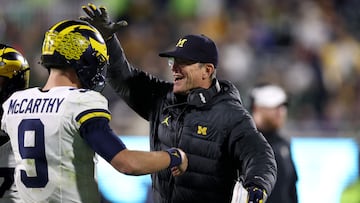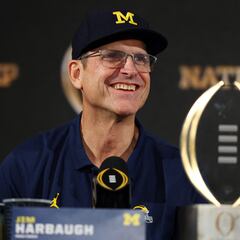What could happen to the University of Michigan football program in the sign-stealing scandal?
It’s clear that some within the program in Ann Arbor did not act correctly. Though internal decisions have been taken, the NCAA’s ruling is still to come.


From an ongoing situation involving the head coach to the initiation of an investigation into the program’s practices, the Wolverines appear to have some questions to answer. While it remains unclear where this all ends, it’s certain that some will be held accountable before it does.
As things stand, Michigan coach Jim Harbaugh has denied all claims that the program attempted to steal opponent signs and has given assurances that the school will cooperate with the NCAA investigation. It is worth noting of course, that Harbaugh himself is already the subject of an NCAA investigation into Level II violations related to recruitment practices during the covid-19 dead period, as well as giving misleading information to investigators.
I’d be shocked if Michigan is given the opportunity to play in the Big Ten Championship this season or compete in the College Football Playoff this season. I’d also be shocked if Jim Harbaugh is still the head coach of Michigan Football by January.
— Sam Block (@theblockspot) November 1, 2023
What is sign-stealing?
There are plenty of signs and signals used by all football teams to communicate specific plays and specific responsibilities. This brings us to NCAA Bylaw 11.6.1, which states: “Off-campus, in-person scouting of future opponents (in the same season) is prohibited.” Now, while that makes sense, it’s interesting to note that sign-stealing itself is not technically against the rules unless said signs and signals are recorded and subsequently used during games by coaches.
Where Michigan is specifically concerned, it’s alleged that the Wolverines had individuals attend games of future opponents as well as College Football Playoff opponents in an effort to record and steal signs. Though one could argue that there is a lot of ‘grey’ in this situation, it’s not a good look.
.@RossDellenger (Ross Dellenger) shares how Big Ten schools became aware of Michigan's possible sign-stealing tactics. pic.twitter.com/yNVt368TcB
— Dan Patrick Show (@dpshow) October 20, 2023
So, what happens with Michigan now?
It remains unclear what happens next, however, Week 8 opponent, Michigan State, was notified of the alleged in-person scouting and while the news wasn’t well received, it did not change the school’s approach. MSU interim president Teresa Woodruff referred to the allegations as “concerning,” but added that they wouldn’t do anything to alter plans against a long-time rival.
We’ll have to wait and see how the NCAA handles this situation. They’ll have a tough time proving that Coach Harbaugh knew about the Connor Stalions operation. That said, it’s hard to imagine that the Wolverines head coach didn’t know what was going on.
The NCAA could prevent the Wolverines from competing in the Big Ten Championship or in a bowl game. Some media are talking about even a harsher sentence, which could include shutting down the program for a year or taking away voting rights. It depends on how harsh the NCAA determines the cheating was and if it broke any rules.
Related stories
The problem the NCAA has is that if it just gives Harbaugh a slap on the wrist, other teams could be tempted to do the same thing. This is Michigan we’re talking about, one of college football’s powerhouses and the NCAA will be tempted to make an example out of them.
National sports (not just college football) media shows are now picking up the Michigan cheating scandal and calling for @bigten commissioner, Tony Petitti, to harshly punish Michigan for their scandal this season.
— The Big Ten Huddle 🎙️ (@TheBigTenHuddle) November 1, 2023
Do you agree or disagree? pic.twitter.com/NtL4tKdlTe
Michigan suspends analyst amid investigation
According to a statement from university athletic director Warde Manuelon Friday, Michigan suspended analyst Connor Stalions with pay for the duration of the NCAA’s investigation into alleged ‘sign-stealing.’ It is understood that Stalions, who was hired by the program in 2022 as an off-field analyst and is a retired United States Marine Corps captain, was identified as a person of interest. To that end, the NCAA sought information connected with his computer access.
Video from last year's OSU vs Michigan game appears to show Connor Stalions who is at the center of the alleged sign stealing operation standing next to the UM defensive coordinator.
— Adam King (@AdamKing10TV) October 24, 2023
See their pre-snap interaction:
Here is better quality video and story https://t.co/aOX1HCRdmN: pic.twitter.com/Q6nNYt2t9x

